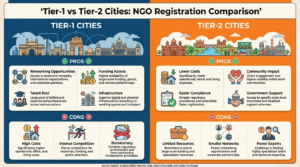Divorce, as the legal dissolution of a marriage, can be a complex and emotionally challenging process. In Delhi, the bustling and dynamic capital of India, navigating the legal landscape of divorce requires expert guidance and representation. This is where the role of divorce lawyer in Delhi becomes crucial. Divorce lawyers are legal professionals who specialize in family law and are trained to handle the legal intricacies of divorce cases.
Here we will delve into the essential role of divorce lawyers and how they help individuals navigate the legal challenges of ending a marriage.
Understanding Family Law and Divorce in Delhi
Family law in India, including divorce, is governed by various statutes, such as the Hindu Marriage Act, the Special Marriage Act, and the Indian Divorce Act, depending on the religion and personal laws of the parties involved. Delhi, being a cosmopolitan city with diverse populations, witnesses cases of divorce involving individuals from different religions, including Hinduism, Islam, Christianity, and others. Each religion has its specific marriage and divorce laws, which can add complexity to the divorce process, including court marriage in Delhi.
Divorce can be categorized into two types: contested divorce and mutual consent divorce. In contested divorce, one party files for divorce on specific grounds, such as cruelty, adultery, desertion, or mental illness, and the other party contests the divorce petition. On the other hand, mutual consent divorce occurs when both parties agree to end the marriage and jointly file a petition for divorce, stating their mutual consent.
The Role of Divorce Lawyers
Divorce lawyers play a vital role in assisting individuals who are going through the divorce process. They provide legal expertise, representation, and support to their clients, helping them navigate the legal challenges and complexities of divorce. Here are some essential roles that divorce lawyers fulfill:
1. Legal Advice and Guidance: Divorce lawyers provide legal advice and guidance to their clients, helping them understand their rights, responsibilities, and legal options. They explain the legal provisions, procedures, and implications of divorce under the relevant laws, helping their clients make informed decisions throughout the divorce process. They also help clients understand the potential outcomes of their case, including issues related to property division, child custody, alimony, and other relevant matters.
2. Document Preparation and Filing: Divorce cases involve extensive paperwork and documentation, including petitions, affidavits, financial disclosures, and other legal forms. Divorce lawyers assist their clients in preparing and filing the necessary documents in the appropriate court, ensuring compliance with the procedural requirements and deadlines. They also help clients gather and organize the required evidence, such as financial records, property documents, and other relevant information, to support their case.
3. Negotiation and Settlement: Divorce lawyers play a crucial role in negotiating on behalf of their clients to achieve fair and reasonable settlements. They engage in negotiations with the opposing party or their legal representatives to resolve disputed issues, such as property division, alimony, child custody, and visitation rights. They strive to protect the best interests of their clients and work towards finding mutually acceptable solutions, avoiding lengthy and costly court battles wherever possible.
4. Representation in Court: If the divorce case goes to court, divorce lawyers represent their clients in the judicial proceedings. They present their client’s case before the judge, cross-examine witnesses, argue on legal points, and advocate for their client’s interests. They use their legal expertise and experience to navigate the complexities of court procedures, rules of evidence, and legal arguments, ensuring that their clients’ rights are protected and their case is presented effectively.
5. Mediation and Alternative Dispute Resolution: Divorce lawyers also play a crucial role in helping clients explore alternative dispute resolution methods, such as mediation or arbitration. Mediation is a process where a neutral third-party mediator facilitates discussions between the divorcing parties to help them reach a mutually agreeable resolution. Divorce lawyers in Delhi can represent their clients in mediation sessions, provide legal advice during the process, and help negotiate favourable settlements. Mediation can be a less adversarial and more cooperative approach to resolving divorce-related disputes, and divorce lawyers can effectively advocate for their clients’ interests in such settings.
6. Child Custody and Support: Child custody and support are often significant issues in divorce cases involving minor children. Divorce lawyers play a critical role in advocating for their clients’ rights and interests in child custody matters. They assist in developing parenting plans, determining custody arrangements, visitation schedules, and advocating for their clients’ preferred outcome. They also help in calculating child support as per the applicable laws and ensuring that their clients’ rights and obligations regarding child support are protected.
7. Division of Assets and Liabilities: Divorce involves the division of assets and liabilities acquired during the marriage, which can be a complex and contentious process. Divorce lawyers assist their clients in identifying, valuing, and dividing marital property, including real estate, financial assets, investments, and other possessions. They also help in determining and allocating marital debts and liabilities, ensuring that their clients’ interests are protected and that the division is fair and equitable according to the applicable laws.
8. Emotional Support and Empathy: Divorce can be an emotionally challenging and distressing experience. So you should search advocate near me on internet; neighbouring divorce lawyer can relatively be more helpful he/she will not only provide legal guidance and representation but also offer emotional support and empathy to their clients. They understand the emotional toll that divorce can have on individuals and provide a compassionate ear, helping their clients cope with the emotional challenges of the process. They offer guidance and resources to help clients manage their emotions, make informed decisions, and navigate the divorce process with resilience and strength.
To conclude, divorce lawyers play an essential and multi-faceted role in helping individuals navigate the legal challenges of ending a marriage. From providing legal advice and guidance to document preparation, negotiation, representation in court, and emotional support, divorce lawyers are invaluable resources for individuals going through a divorce. If you are facing a divorce, engaging the services of an experienced and skilled divorce lawyer can be crucial in ensuring that your legal rights are protected and that you are able to navigate the divorce process with confidence and clarity.





Be First to Comment